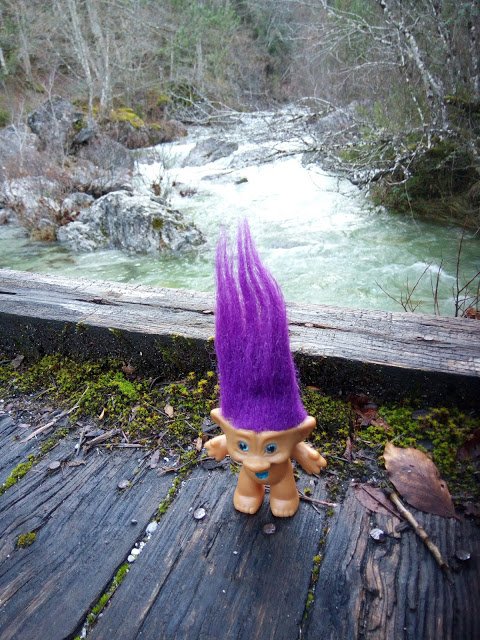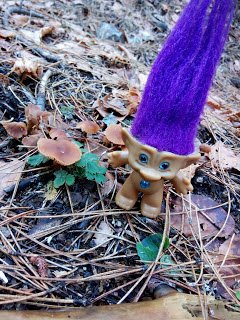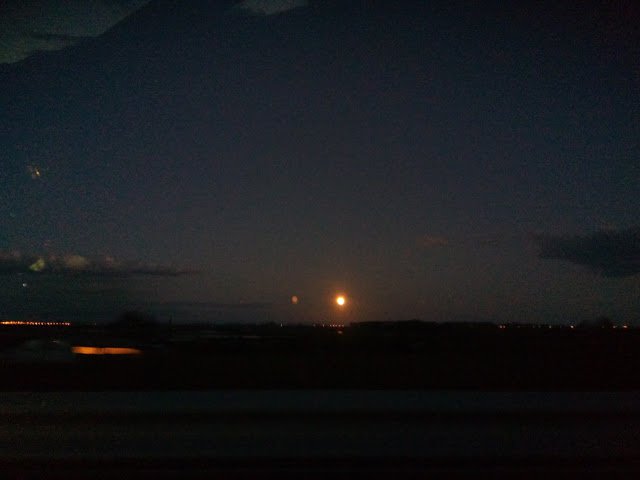So, I was out most of the day today, we took advantage of the spring-like weather, got in the car and went to explore some new paths up on the mountain.

My little troll enjoyed his hike...

... found where the Smurfs live!


And thought he could become a christmas decoration :P

As the sun started to set we decided to go home and on the way back down from the mountain I noticed that the setting moon was particularly large!

I didn't remember it was a full moon tonight. The view was just amazing, no photo can depict what we saw! The bright golden disc coming out of the clouds...a miracle, the absolute miracle!

As I was watching it stunned I thought, hey, is it a supermoon tonight? Then came home to turn my computer on and hit google. Guess what? It is a supermoon!
Supermoon? Another DC character?
No! The supermoon looks bigger than the other full moons, because it happens when our natural satellite approaches his cosmic companion more than any other time. This name came from the astrologer (yes, astrologer, not astronomer) Richard Nolle in 1979. Another term for it is perigee syzygy of the earth–moon–sun trilogy. The moon's orbit around the earth is elliptical, which means that it will be farther from our planet at some points and closer at some others. The moon's farthest position is called the apogee and the closest to the earth position is the perigee.
A supermoon happens when a full or new moon is at the points closer to earth. In order to be considered as a full moon it should be at most 226,000 miles away from the earth. Weird effects of a supermoon haven't been observed, at least nothing more than the usual tides that are more intense around a full moon time.
How often do they happen?
Supermoons don't occur every month and that's because the elliptical orbit of the moon causes it to change its orientation as the earth orbits the sun. The last supermoon was in November, but they don't necesarily happen in every calendar month.
Calendar month?
Yes, there is a distinction between the calendar month that lasts 30-31 days (except February that is 28 days long and every four years it gets to add one more day) and the lunar month that is the time the moon takes to complete a passage through all its phases (new, half, full and new again). A lunar month lasts about 29.5 days. Don't misunderstand it with the 27.3 days it takes the moon to perform a complete orbit around the earth. The lunar month measures the time the moon takes from a viewpoint of the sun at a specific phase (new) back to the same viewpoint and phase.

(Image source - Author, Betty Wills (Atsme) - License)
Is there a micromoon as well?
There is indeed, it's called apogee syzygy, and happens when the moon is at its farthest from the earth. During this time, the moon appears smaller and not so bright.
Three supermoons in a row
The next two full moons coming in January (one on the 2nd and one on the 31st) will also be supermoons. The latter will be called a blue moon, since it will be the second full moon in the same month. Only it won't be blue but...red! Yes, you read it right, it will be red because on the night of the 31st January we will witness a total eclipse of the moon.
For more information on times and dates of the moon's eclipses, visit NASA's website: eclipse.gsfc.nasa.gov
Don't wait any longer! Grab your loved one by the hand, put your warm jackets on and get out for a super-romantic winter full moon!
And here is the perfect soundtrack for it ;)
References
wikipedia.org
space.com
universetoday.com
earthsky.org_1
earthsky.org_2
*All non-credited images by @ruth-girl
 Thank you for being here and reading this. If you like my writing, you can visit my blog for more ;)
Thank you for being here and reading this. If you like my writing, you can visit my blog for more ;)
This week's posts:
* Short Story - Where Do People Go When They Die
* A Taste Of Sweden (Part 3 - Stockholm Aquaria)
* Bizarre Natural Phenomena Vol.33 - Barbie's Lake (Australian Lake Hillier)
* Atopic Dermatitis - The Bummer!
* Let's Learn Something Cool - The Solar System (The Trolls Are Back!)
Special thanks and mentions:

Until my next post,
Steem on and keep smiling, people!


